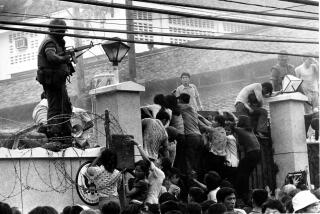Ellen J. Hammer; Scholar Wrote About Conflicts in Southeast Asia
- Share via
Ellen J. Hammer, well-known scholar and author on Vietnam and Southeast Asia whose books helped explain the historic international conflicts of that troubled region, has died. She was 79.
Hammer died Jan. 28 in New York of lymphoma.
With a doctorate from Columbia University, Hammer established herself in the early 1950s as an expert on French colonial policy in what was then known as Indochina, and later became designated Southeast Asia. She wrote her first major book, “The Struggle for Indochina,” published in 1954.
The book became a classic text for U.S. journalists who covered American involvement in Vietnam.
As American troops streamed toward Saigon in 1966, Hammer published her second book, a high school text titled “Vietnam: Yesterday and Today.”
Perhaps prophetically, that book contained the statement: “The past history of civilizations and nations shows only too clearly that satisfactory solutions are not necessarily the outcome of human endeavor.”
Oddly, Hammer abandoned writing about the country for two decades before penning her masterwork, “A Death in November: America in Vietnam, 1963” in 1987.
Douglas Pike, a UC Berkeley director of Indochina studies who reviewed Hammer’s 1987 book for The Times, called her “one of the Vietnam War’s walking wounded.”
“As was not uncommon with the pioneer American scholars who went to Vietnam in the 1950s,” Pike wrote, “she fell in love with the country and its peoples, then was traumatized as the war’s devastation broadened and intensified.”
Hammer’s book described the downfall and fatal shooting of Ngo Dinh Diem in a November 1963 coup d’etat, and examined American complicity.
“This is a deceptively intricate book with depths that can be missed on a casual reading,” Pike said in his review. The value of the book, he said, was not in new revelations--he found none--but in its power to put readers in a philosophical frame of mind.
“It is so thoughtfully and painstakingly put together,” he wrote, “that the reader is hypnotically induced to speculate anew on the precise meaning of the war and, if not to change, at least to reexamine his opinions and beliefs so long held. Only a rare book can do this, and is why I believe this volume is destined to become something of a classic.”
Hammer left no survivors.
More to Read
Sign up for our Book Club newsletter
Get the latest news, events and more from the Los Angeles Times Book Club, and help us get L.A. reading and talking.
You may occasionally receive promotional content from the Los Angeles Times.










